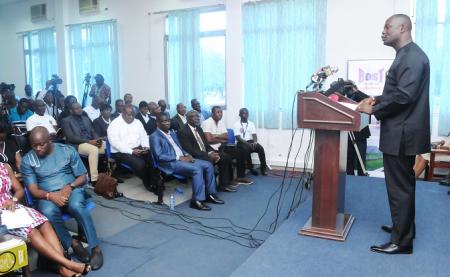by MUSAH YAHAYA JAFARU
Ghana has begun supplying gasoline and gas oil to the landlocked countries of Burkina Faso, Niger and Mali from the Bolgatanga Petroleum Depot.
The state-owned Bulk Oil Storage and Transportation Company (BOST) Limited is also supplying petroleum products from the depot to Benin and Nigeria.
The Minister of Petroleum, Mr Emmanuel Armah-Kofi Buah, who made this known at the meet-the-press series in Accra yesterday, said there were plans to extend the exports to Liberia in the coming months.
Making reference to the President’s State of the Nation Address in 2016, the minister said the vision of the government was to make Ghana the hub for the distribution of petroleum products in the West African sub-region.
The Bolgatanga Petroleum Depot, with a capacity of 46 million litres of refined gasoline and gas oil, was re-inaugurated in August 2015.
Gasoline is a transparent, petroleum-derived liquid that is used primarily as a fuel in internal combustion engines. It consists mostly of organic compounds obtained by the fractional distillation of petroleum, enhanced with a variety of additives.
Gas oil, on the other hand, is a group of petroleum distillation products having boiling points between kerosene and lubricating oil.
The event, on the theme: “Transforming Ghana’s oil and gas industry”, focused on the various projects being undertaken in the oil and gas industry and the future plans for the industry.
New gas era
Mr Buah said Ghana had been ushered into a new gas era that would guarantee its energy security for the next two decades.
“Despite the global downturn in the oil industry, we have managed to increase production.
“Ghanaians have been empowered to be at the forefront of the industry and a liberalised petroleum downstream sector with strong private sector participation where product availability, competition, better customer service and lower prices are making Ghana the preferred destination for doing business in the sub-region,” he said.
He said the Ghana Gas Company (Ghana Gas) had completed the extension of its pipeline to the battery limit of the West Africa Gas Pipeline Company’s (WAPCo’s) Regulatory and Metering Station at Aboadze and indicated that Ghana Gas was awaiting WAPCo to interconnect.
“In the long term, a 290-km onshore pipeline to ensure gas supply reliability and downstream infrastructure expandability is planned.
“Additional volumes will, in the long term, provide the opportunity for Ghana to realise its vision to utilise gas for the other industrial uses, beyond power generation, such as fertiliser and petrochemicals,” he said.
National strategic stock
Mr Buah said Ghana’s strategic stock was at an all-time high, with about one million metric tonnes of petroleum products imported from January to June 2016.
He said the feat was chalked up following the restructuring of BOST, which had been successful in ensuring the availability of petroleum products in the country.
“The restructuring of BOST has resulted in a turnaround in the performance of this strategic national asset which is now successfully fulfilling its mandate of ensuring the availability of petroleum products,” he said.
Legal framework
The minister said the ministry had begun work on the development of a gas policy and a gas act that would provide a transparent regulatory framework for the gas industry.
He said the act would address infrastructure requirements, funding and institutional mandate for gas sector agencies.
It would also provide a revised gas pricing policy reflecting the country’s priorities.
Mr Buah said the country continued to maintain its position as a preferred investment destination, despite the downturn in the global oil and gas industry.
That, he said, was the result of the conducive legal and regulatory framework put in place.
TOR revamping
He said the comprehensive restructuring of the Tema Oil Refinery (TOR) undertaken by the government last year had started producing results.
For instance, he said, the strategic partnership between BOST and TOR had brought back life to the refinery, as BOST purchased crude oil for TOR to refine at a tolling fee.
Rural LPG programme
The government had so far distributed more than 60,000 six kilogramme (kg) cylinders, cook stoves and related accessories in 37 districts across six regions, he disclosed.
Mr Buah said the government would scale up the distribution of the cylinders, stoves and related accessories to 100,000 by the end of this year.
Downstream/upstream projects
The minister said despite the challenges with the Floating Production Storage and Offloading (FPSO) vessel, the FPSO Kwame Nkrumah, production from the Jubilee Field remained steady.
Cumulative production from the field, as of September 2016, was approximately 181 million barrels of oil and 41bcf of gas exported to the gas processing plant.
Mr Buah said a third FPSO, currently under fabrication in Singapore, for the Sankofa Gye Nyame Project, was 80 per cent complete.
The upstream petroleum industry had experienced tremendous growth, especially after the Jubilee commercial discovery, the minister said.
He added that 18 petroleum agreements were in place and at various stages of delivery of their work programmes, while 21 new major discoveries had been made since Jubilee and were being assessed.
To read the full piece from Graphic Online, click here.

